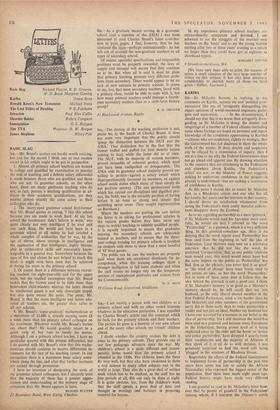SIR,—The destiny of the teaching profession is not, praise be,
in the hands of Charles Brand. It does not seem very important that the public should 'grasp the distinction between the NUT and the AMA.' That distinction lies in the fact that the former huffed and puffed for four months before coming to heel, while the latter did so at once. The NUT, with its majority of women members, proved incapable of coherent protest, which need not have been undignified or irresponsible. The AMA with its grammar school majority proved un- willing to protest—against a salary award which disproportionately favoured its members, or against school meals duties which many of them simply do not perform anyway. (The one professional body which has carried out disciplined and dignified pro- test, the NAS, was in the enviable position of having before it an issue so strong and simple that quibbling never arose. They sought representation on Burnham.)
Where the teachers are putting the cart before the horse is in asking for professional salaries in the various grades before they have taken any steps to restrict teaching to suitably qualified people. It is equally important to ensure that graduates entering the secondary schools are adequately trained as teachers, and to ensure that the three- year college training for primary schools is lavished on students with more to show than a mere handful of '0' level passes. The public can be sure the teachers are properly paid when there are occasional dismissals for in- competence, when the training colleges show a stronger inclination to fail some students and when the staff rooms no longer rely on the temporary services of unemployed graduates and visitors from the Commonwealth.
W. 0. BOYD
25 Girton Road, Greenford, Middlesex














































 Previous page
Previous page